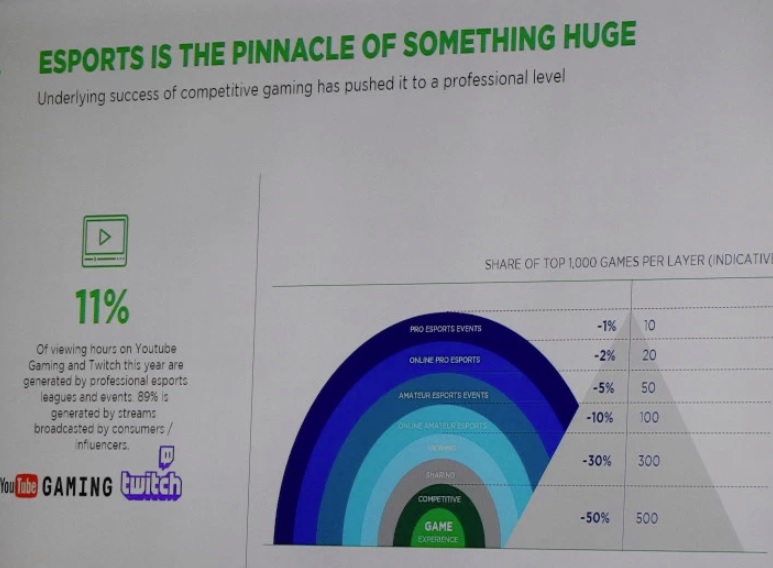
Above: 11 percent of all viewing hours on YouTube and Twitch are generated by esports leagues and events.
GamesBeat: Team owners have to make a lot of leaps of faith. Things are so much in flux. You have to take into account things like–little differences in the games can be a big deal. Call of Duty will have the Blackout mode this year. If that’s successful, maybe Fortnite has something to worry about. Maybe Overwatch has something to worry about with Fortnite. These competitive shifts can cause disruption for teams.
Warman: There are so many games to choose from. Fortnite and PUBG have shaken up the whole world. It’s still possible that big hits can suddenly come in. We thought that was almost impossible. It’s exciting, but it’s made some people worry. When we get questions about where people should put their money–they ask, “Isn’t there a way I can invest that’s agnostic relative to hits?” That’s hard.
GamesBeat: Do you have some general ideas of what has been or will be successful, though? As opposed to certain games that just aren’t cutting it as esports.
Warman: You have the sports simulation group, and I think those esports activities will have no trouble earning good money. They have all the sponsor connections. It’s not as frightening for sponsors to step in. Their challenge is to provide something that’s engaging and exciting. The games need to be adjusted. There’s a lot that needs to change for the games to fill a stadium with screaming people. Many of these games are single-player. You have to change that. Part of the thrill is the strategy of team play. Their challenge is more audience engagement.
June 5th: The AI Audit in NYC
Join us next week in NYC to engage with top executive leaders, delving into strategies for auditing AI models to ensure fairness, optimal performance, and ethical compliance across diverse organizations. Secure your attendance for this exclusive invite-only event.
GamesBeat: If you want to fill a stadium, you could do it with the traditional athletes.
Warman: I have a personal opinion around that, but–it will be more directly compared with something that exists in real life. That’s always difficult.
Then you have the existing core franchises that have been around. Can Battlefield or Call of Duty come in and make a difference? I think they can, if they don’t underestimate the key mechanics of a successful esports experience. It’s not only about competition. The aspect of League of Legends where you choose the champions just before the game, and you change your strategy depending on what the other team chooses, that component, people know that’s all behind the game. Those are components people don’t talk about a lot, but if it’s not in the mix of an offering, then the chances of it being big as an esports title are slim.

Above: The esports opportunity
GamesBeat: You might think that if a game sold its TV broadcast rights, got sponsored and well under way, then it would be a success. But if you look at a market like China that doesn’t necessarily apply, because China has a state-owned media. It’s a lot harder to pull off that kind of big medial deal in a place like that.
Warman: That’s why I find it interesting that Huya spent money on Korean rights. If Huya and Douyu, the two big platforms, go head to head bidding for content, that’s a very similar situation to Twitter and Facebook bidding up rights.
GamesBeat: In this case you have different media companies coming in, Twitch-like companies.
Warman: Exactly. These are not traditional media companies over there. But it hits on an interesting point. The linear media companies all want to have more digital. When they talk to Activision Blizzard, they want digital rights to boost their digital strategy. That’s what they lack. You would expect the traditional guys to be after traditional rights, but they all want the digital stuff as well, to expand their offerings. The digital rights for esports now sell at a multiple of the linear rights. A lot of games are left with the linear rights. Digital is what even the traditional companies go for.
GamesBeat: When you gave your talk, you had some more futuristic ideas. Do you think we’re heading in the direction of a sort of leisure economy, as increasing numbers of people get paid to do things like play games? YouTubers are a good example, streams. Not all of them are giant celebrities, but they’re making a living.
Warman: Getting credit back for something you put your personal time into–it could be playing a game, but it could also be, I don’t know, answering questions in your neighborhood that people have. It could be all kinds of services. It doesn’t particularly have to be hard cash. It could be something that can give you enough to survive on. I’d even say you could have a credit system that automatically works, like an allowance. Even if you don’t do anything, or just do some basic things, you at least have some income. But I’m sure that we need to–I think it will happen. We have to be proactive in that, so we’re not so late that the divide between haves and have-nots is accelerated by technology. It should be more seamless.

Above: Newzoo’s vision for the esports business of 2021.
GamesBeat: It seems like digital systems could be set up to find people who are putting time into something and getting them paid for that.
Warman: It also applies to product development. With all this video streaming–I’ve been saying that sports can be monetized in different ways. They can learn from games. Every time you look at something involving currency or gifting, things like that, you need a second layer for marketing.
There’s never been such a massive possibility for A/B testing as with mobile games. We have paid games and free games. The consumers have decided that the model of free stuff fits best. They’ve decided that a system of two currencies works best. If you’re developing a new monetization method, you should think about a marketing currency and a money currency. But this is only going so far in my head. Looking at things like loyalty systems at companies, I’d love to apply the smart mechanics of gaming to those systems. That would be my startup.
GamesBeat: You guys are doing interesting work in finding where the real opportunity is in esports.
Warman: How separate can you see esports from the larger world of game streaming? I wanted to ask Nate Nanzer about how much involvement or responsibility he sees for the 80 percent of all the hours on Twitch and YouTube that aren’t the Overwatch League, but just people streaming the game. Isn’t that part of their entertainment experience? Can you pay those streamers, do something for them?
I have a feeling that for Epic Games, with all that money they have, their idea isn’t around putting it into esports, but having that money spread all across the long tail. That’s what I hope for. I’m curious about what they’re going to do with that promise.
GamesBeat: Each league is making seemingly small decisions about how to set themselves up, and they turn out to be very important in the long run. Are you sharing money with your teams or not?
Warman: Right, or do they build their own business and make their own sponsor deals? Can they get the traditional sports owners to allow streamers to talk over their content and mash up summaries of their content? There may not be enough streams of good enough quality from live events quite yet, but–every time I watch a sports match now, I just think, “Why am I forced to listen to this one old guy talking over my game? I’d like to hear my favorite streamer, who I find way funnier.” I want to pick an audio track over the sports I watch. The only guy I’ve heard talking about that was from NASCAR.
They need to dare to put a little bit more power into the hands of consumers. If the development chain of the content is completely closed — “It’s finished, now you can watch it” — the young consumers, that’s not what they expect. They expect to be part of it, or to have someone else they trust make something in the style that they’re used to.
Disclosure: The organizers of Esports BAR paid my way to Miami. Our coverage remains objective.


